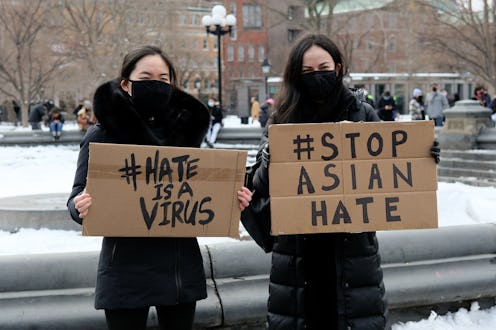Taking Action
4 Ways To Support Asian-American Communities Right Now
Following a mass shooting in Atlanta, Georgia, here are a few ways to stand up for AAPI communities.

Over the past year, racist rhetoric around the pandemic has inflamed anti-Asian violence across the country. On March 16, eight people, six of whom were Asian women, were killed in mass shootings at three different spas across the Atlanta, Georgia, area, the Atlanta Journal Constitution reported. The 21-year-old shooting suspect was taken into custody, and authorities have not released information about the shooter’s motive, per CNN. The mass shooting follows assaults on Asian American elders in California in January, which triggered a national conversation about how to support Asian American communities following the racist attacks. After the fatal violence on Tuesday night, people on social media are continuing to call for solidarity with Asian American communities, particularly low-income and working class ones.
Hate crimes fueled by anti-Asian racism rose by 1,900% in New York after the start of the pandemic, according to the Queens Chronicle. The paper reported in September that from March to May 2020 alone, over 2,500 race-based incidents against Asian Americans were reported across the country. The Stop AAPI Hate campaign found that one in six discriminatory incidents reported against Asian Americans since the pandemic began were committed against young people.
If you want to show solidarity, you can join AAPI-led efforts to combat anti-Asian racism. That can involve reporting racist incidents or donating to the families of Asian elders. Asian Americans and Pacific Islanders are less likely than other racial and ethnic groups in the U.S. to have access to needed mental health resources, according to a 2015 study, so you can make sure your friends and social media networks know how to access AAPI-specific mental health care. While you're at it, make sure you speak up when someone makes anti-Asian "jokes" about the pandemic, too.
These ways to support Asian American communities in the face of racist attacks are just a starting point, because taking care of each other is a must.
Donate To Affected Communities
Sending money to directly affected communities can make a big impact, quickly. Donations to the Atlanta chapter of the National Asian Pacific American Women’s Forum (NAPAWF) work to support economic justice and reproductive justice, and Asian Americans Advancing Justice — Atlanta is a nonprofit legal advocacy org that works to protect the civil rights of AAPI community members in Atlanta. Red Canary Song is a grassroots collective of Asian and migrant sex workers that was founded after the death of Sang Yong, a Flushing, Queens, massage worker who was killed in a police raid in 2017. Donations to the organization support mutual aid efforts, a language exchange, a mobile health van, and more.
You can also donate to this GoFundMe for Asian American community organizations in the Bay Area, including the Filipino Cultural Center, the Asian Prisoner Support Committee, the Oakland Vietnamese Community Center, the Chinese Progressive Association, and the Asian Law Caucus. New York Magazine has a fairly comprehensive list of national social justice organizations and mutual aid networks that support AAPI communities that are accepting donations.
Report Anti-AAPI Racism
The nonprofit and organizer coalition Stop AAPI Hate is requesting that people send information on anti-Asian violence across the country. The campaign has been collecting qualitative and quantitative data from across the country on what kinds of hate incidents are occurring, to whom (across age, gender, and background), and with what mental health impacts. "By gathering info," their site says, "we can push for better protection, educational resources, and policies that can put an end to this." You can fill out their anti-Asian racism reporting form in the language of your choice here.
Promote Asian American Mental Health & Safety
In addition to educating yourself on how to respond to encountering racist attacks, promoting awareness of and access to culturally competent and AAPI-specific mental health resources can help keep communities emotionally safe. You can start by letting your friends and social networks know about the Asian Mental Health Project's weekly Stay-In Check-In Asian American community wellness events. These online events have featured topics ranging from finding the right therapist for you to unpacking people-pleasing as a trauma response. (If you want to donate to support these events, you can do that here.) And when you or your bestie is looking for some professional mental health care, check out (and post about!) the National Queer Asian Pacific Islander Alliance's Asian and Pacific Islander healer network and therapy resource list.
Object To Racist COVID Comments
Whether on social media or in your last Zoom call, you might have heard people making anti-Asian, racist "jokes" about the pandemic. Former President Donald Trump's racist rhetoric around the pandemic — calling COVID the "China virus" or "kung flu," among other phrases — has fostered the acceptance of these kinds of comments, experts say.
Calling out that language is an important part of fighting racism and showing allyship. If confrontation isn't your style, the Asian Pacific American Labor Alliance suggests trying something like, "I don't get it. Can you explain why that's funny?" They also offer a more direct response to COVID-related anti-Asian racism: "That's not funny and that is not how the virus actually works."
This article was originally published on